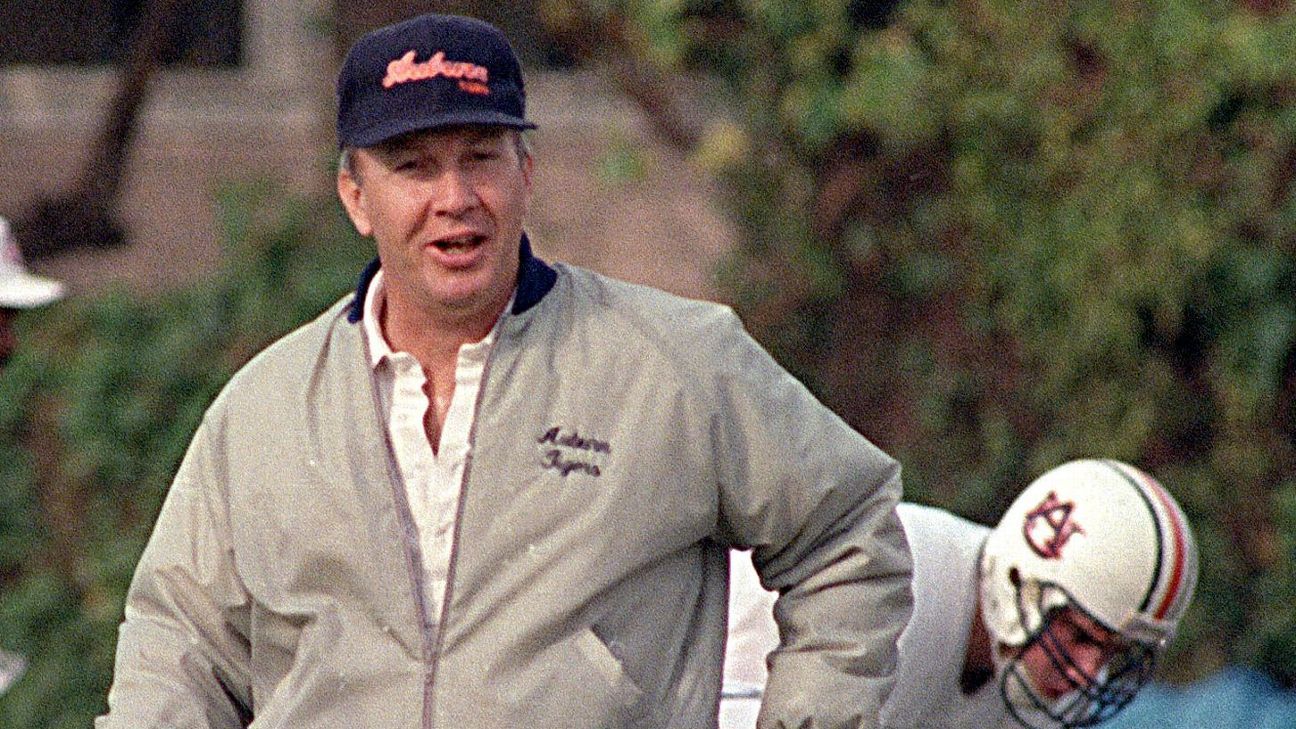
Former Auburn football coach and athletic director Pat Dye, who was hospitalized last month for kidney-related issues, died Monday, according to a family member. He was 80.
Lee County (Alabama) coroner Bill Harris said Dye died at a hospice care facility in Auburn from complications of kidney and liver failure.
Dye had tested positive for the coronavirus but was asymptomatic, his son, NFL agent Pat Dye Jr., told ESPN last month.
Dye guided the Tigers to a 99-39-4 record in 12 seasons from 1981 to 1992, winning at least a share of SEC championships in 1983, '87, '88 and '89. His Auburn teams won at least 10 games in a season four times and bowl games six times.
He was inducted into the College Football Hall of Fame in 2005, the same year the playing field at Auburn's Jordan-Hare Stadium was named in his honor.
Dye was a three-time SEC coach of the year and 1983 national coach of the year. He coached a Heisman Trophy winner (Bo Jackson, 1985); an Outland Trophy and Lombardi Award winner (Tracy Rocker, 1988); and 21 All-Americans, 71 All-SEC players and 48 academic All-SEC players.
Dye was Auburn's athletic director from 1981 to 1991. He also coached at East Carolina from 1974 to 1979 and Wyoming in 1980 and had a 153-62-5 record in 19 seasons overall.
He had been spending much of his time in recent years at his farm in Notasulga, Alabama.
Former Georgia coach and athletic director Vince Dooley, who played quarterback at Auburn in the 1950s, coached against Dye's teams from 1981 to 1988.
"He was a very tough competitor," Dooley told ESPN. "He related very well to his players. He was a real fighter in that respect and was right there in the trenches with them. We competed hard against each other, but we always had a good relationship."
Dye will always be remembered by Auburn people for getting the Tigers' annual game against rival Alabama moved from Birmingham, Alabama, to a home-and-home series. The Iron Bowl was played at Auburn for the first time on Dec. 2, 1989, when the Tigers upset No. 2 Alabama 30-20 at Jordan-Hare Stadium.
"That's the thing that endeared him to the Auburn people," Dooley said. "He was responsible for getting that game out of Birmingham and bringing it home and home, and he was able to be highly competitive against the great Bear Bryant."
When Dye interviewed for Auburn's coaching vacancy before the 1981 season, one of the selection committee members asked how long it would take him to beat Alabama, which had defeated the Tigers eight straight times.
Dye famously quipped, "Sixty minutes."
The room fell silent before Dye added, "You seldom beat them in anything in less than 60 minutes."
Auburn beat Alabama 23-22 in Dye's second season in 1982. His teams went 6-6 against the Tide, winning four games in a row from 1986-89.
Dooley said he and Dye remained close friends over the years because of their mutual affinity for gardening and plants. Dooley said he visited Dye's nursery and farm in Alabama, and Dye toured the gardens behind Dooley's home in Athens, Georgia.
"Our relationship grew even more after football because of our mutual interest in plants, particularly Japanese maples," Dooley said. "We swapped some of our favorite plants on a couple of occasions."
Dye was born Nov. 6, 1939, in Blythe, Georgia. He was a two-time All-American as a two-way starter at guard and linebacker at Georgia, where his older brothers, Wayne and Nat, also played. He helped lead the Bulldogs to the 1959 SEC championship and was named SEC Lineman of the Year as a senior in 1960. He spent three years playing for the Edmonton Eskimos in the Canadian Football League, followed by two years in the U.S. Army. Bryant hired him as an assistant at Alabama in 1965.















 Phone: (800) 737. 6040
Phone: (800) 737. 6040 Fax: (800) 825 5558
Fax: (800) 825 5558 Website:
Website:  Email:
Email: 






